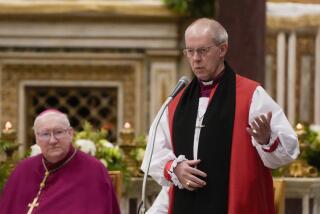Ecumenical Agency Facing Changes
- Share via
GENEVA — Faltering finances and the need for fundamental changes cast a shadow on the nine-day meeting of the Central Committee of the World Council of Churches, the ecumenical agency of 330 Protestant and Orthodox churches.
The 156-member Central Committee supervises the work of the Geneva-based international body and its staff between assemblies, which are held every seven years.
Delegates focused on a 16-page draft text, “Common Understanding and Vision,” calling for the council to move from an independent institution to a “fellowship of churches” that would be part of a larger ecumenical movement.
But even as the committee members sought to draft a vision for the work of the ecumenical agency, finances shadowed all discussions of the future. In a report to the committee, Catholicos Aram I of the Armenian Apostolic Church in Lebanon said that core areas of the council’s work are threatened “because member churches are just not funding the council’s work adequately.”
The report said that the council had a 1995 shortfall of $8.3 million. Overall, income has dropped from about $98 million in 1991 to $67.5 million in 1995. A further drop--to just over $50.8 million--is projected for 1997 and 1998.
The Rev. Konrad Raiser, the council’s general secretary, said many member churches view the council as “a service organization” whose identity over the last 30 years has been shaped by its programs.
But Raiser said the council’s financial woes and its new organizational vision mean that it must “refrain from assuming direct program responsibility in areas where others are better equipped to act.” The council instead should be “enabler, coordinator, communicator, convener, and sometimes mediator,” he said.
Raiser also called for a streamlining of the council’s complex governing structure, which he said ties up “too much energy and too many human and material resources . . . in processes of reporting and decision-making which have only limited effect on the life of the member churches.”
In other action, the council’s Central Committee condemned the U.S. Helms-Burton law, which tightened the economic embargo on Cuba, and called recent U.S. air attacks on Iraq “indefensible on moral grounds.”
More to Read
Sign up for Essential California
The most important California stories and recommendations in your inbox every morning.
You may occasionally receive promotional content from the Los Angeles Times.











